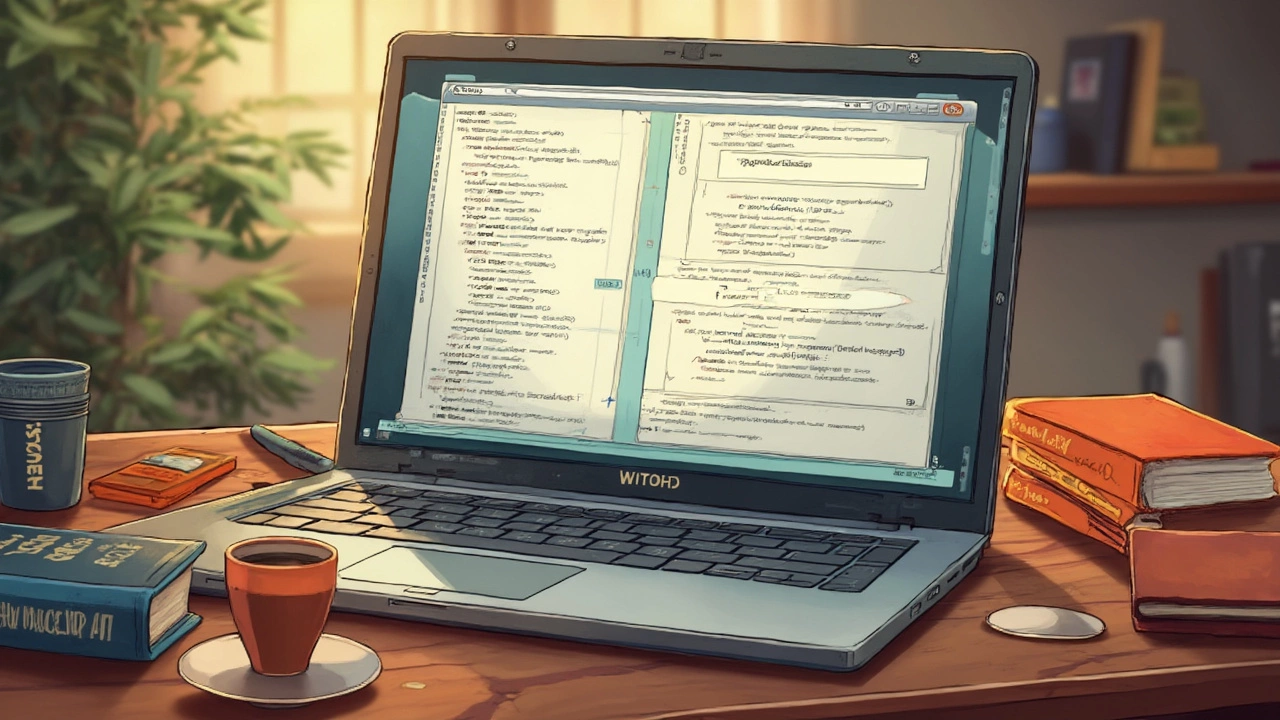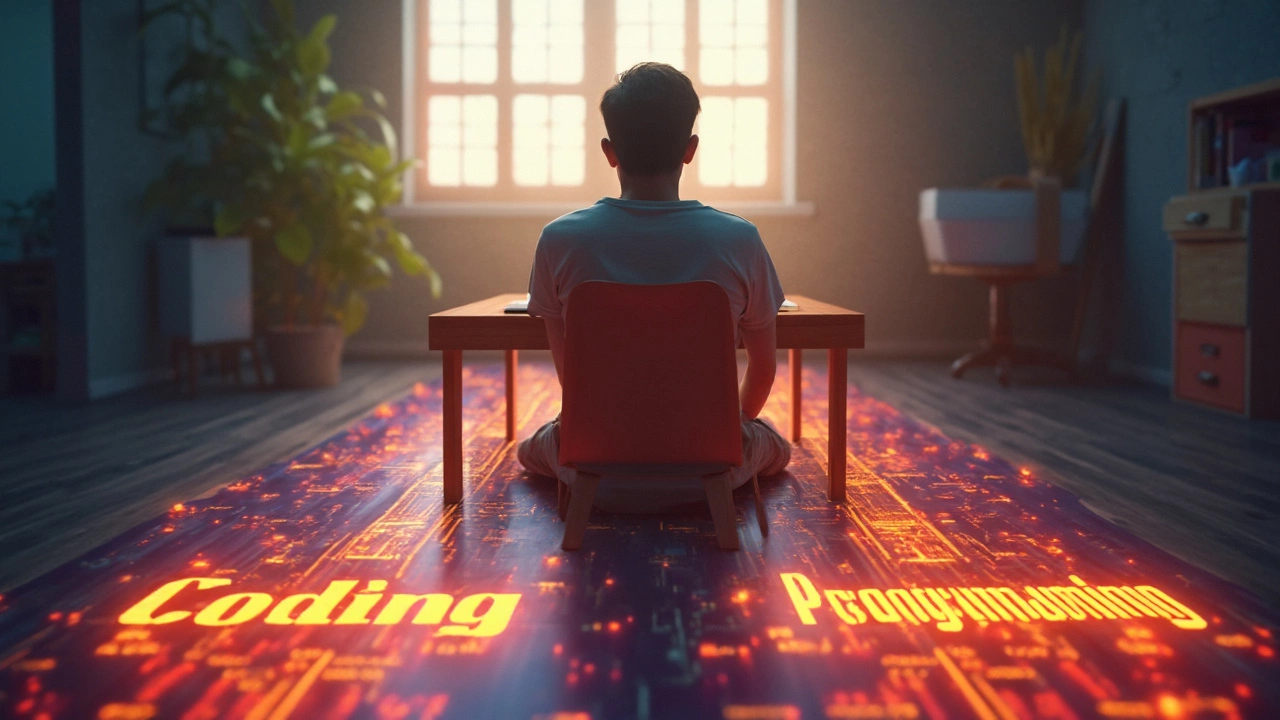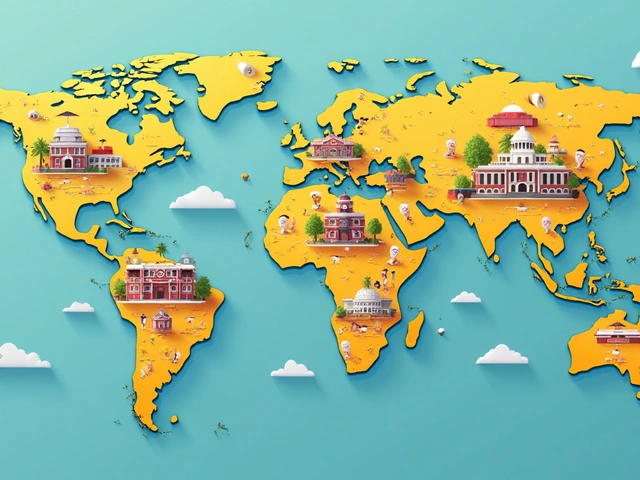You’ve probably heard people toss around 'coding' and 'programming' like they mean the same thing. The truth? They're not quite twins—more like cousins. If you're trying to figure out which skill to tackle first, you need to know what sets them apart and how each one fits your goals.
Coding is about translating human ideas into a language a computer understands. When you’re coding, you’re writing the actual instructions using languages like Python or JavaScript. Programming, though, is bigger. It’s about solving problems—thinking through what you want the computer to do, mapping out a plan, then using code to make it all happen. Think of programming as designing the blueprint and coding as building the house.
- What’s the Difference Between Programming and Coding?
- Why People Get Mixed Up
- Choosing What to Learn First
- Tips for Beginners
- Where to Start: Resources and Next Steps
What’s the Difference Between Programming and Coding?
The words 'programming' and 'coding' get tossed around a lot, sometimes like they mean the same thing. They don’t. Understanding the gap actually helps you pick the right class, book, or project and avoid wasting time.
Programming is all about solving problems. You take a big idea—like building a game or app—figure out the steps needed, plan out how everything should work together, and only then start writing actual code. Programming is about logic, flow, designing, breaking a problem into chunks, and making sure your solution doesn’t fall apart when something weird comes up.
Coding is the hands-on part. You open up a text editor and start typing out instructions in a language like Python, JavaScript, or C++. Coding means knowing the rules for these languages and turning your plan into something the computer can follow without complaining.
- If you’re coding, you’re implementing. You mostly follow clear instructions, either from your head or from someone else’s plan.
- If you’re programming, you’re also designing how everything fits, debugging roadblocks, and thinking about whether your solution is efficient, safe, and flexible.
A useful way to see the difference is to look at what you learn in real classes. Here’s a quick comparison:
| Aspect | Coding | Programming |
|---|---|---|
| Focus | Writing code | Solving problems & designing systems |
| Main Skills | Syntax, fixing errors, using libraries | Logic, planning, algorithms, debugging |
| Tools Used | Code editor, compiler | Flowcharts, diagrams, code editor, version control |
| Example Task | Build a calculator using given steps | Design and code a whole budgeting app from scratch |
| Learning Curve | Steep at first, easier with practice | Bigger picture thinking, more challenging |
If you really just want to jump in and see results—like making simple websites or games fast—coding is your starting point. But if you’re aiming for bigger stuff or want a job with the word 'developer' in the title, programming matters more than you might think.
Why People Get Mixed Up
It's no wonder people get confused—schools, job ads, and tech blogs often swap 'programming' and 'coding' like it doesn't matter. If you Google either term, you'll find articles and tutorials using them both for what looks like the same thing. But there’s a difference, and it actually matters if you’re starting out or picking a class.
Here’s where things get blurry: a lot of entry-level courses say you’ll learn programming, but really, you’re doing basic coding—writing simple scripts, maybe fixing syntax errors. This basic stuff is an important starting point, but it’s just one part of a bigger picture.
Even big companies add to the mix-up when they post jobs. You'll see listings for 'programmers' but the job might just be basic coding—fixing bugs, adding small features. There’s also a ton of overlap in the real world, so folks who code a lot start calling themselves programmers before they’re actually building whole apps or designing how software fits together.
- Pop culture doesn’t help either. Movies and shows throw both words around for anyone working with computers, making it look like just typing fast is all there is.
- Tech isn't great at setting clear labels for beginners—almost every industry guide assumes you already know the difference.
- Online courses may advertise themselves as a 'programming bootcamp' but focus on language basics, leaving students surprised when they're asked to design more complex systems later.
If you’re just starting, don’t stress—you’re not alone. The key is knowing that learning to code is a first step, and programming comes when you're ready to tackle bigger, more structured problems. Understanding this distinction helps you pick the right class and set better goals.

Choosing What to Learn First
If you’re stuck between learning coding or programming first, start by thinking about what you actually want to do. Want to build simple websites, automate small tasks, or just see how computers work? Start with coding. Want to create an app, lead projects, or dig into big software challenges? Go for programming, but prepare to build some basic coding chops before taking on the bigger ideas.
Surveys show most people take their first step by learning to code. In 2024, a Stack Overflow developer survey found that 68% of new learners picked up coding by trying out small web projects or scripts before jumping into formal programming concepts.
| Path | What You Do | Best For |
|---|---|---|
| Coding | Write simple scripts, experiment with code snippets | Newbies, tinkerers |
| Programming | Plan solutions, design software, manage bigger tasks | Aspiring engineers, project-minded folks |
If you want quick wins and confidence boosts, coding lets you see fast results. Run a Python script, make a webpage, or automate your desktop—instant feedback, instant learnings. If you jump straight into programming, you might hit frustration sooner, since understanding logic and planning bites off more than just typing code lines.
Still not sure? Here's a simple checklist to help:
- Are you most excited about building stuff now? Go with coding first.
- Do you want to eventually lead or design whole projects? Start with coding, then add programming concepts.
- Love math, logic, and puzzles? Programming may feel more natural—but basic coding still comes first for most.
Plenty of pros started with just basic coding skills before working up to full-blown programming. The real trick is starting somewhere. Learn coding, then wrap your head around programming as your confidence grows. The keyword here is programming, but nobody gets there without writing their first few lines of code.
Tips for Beginners
If you’re new to all this, you might feel like you’re getting hit with a firehose of jargon. It helps to break things down into small, doable steps. Nobody becomes a software wizard overnight, but you can avoid a lot of the usual headaches by keeping a few things in mind.
- Pick one language and stick with it for a while. Python is usually the go-to for beginners because it’s easy to read and widely used in schools and bootcamps.
- Don’t just watch tutorials—actually write code. You’ll learn way more from making mistakes than watching someone else do everything perfectly.
- Try small projects. Want to build a calculator, a simple game, or a to-do list app? It doesn't have to be fancy—just build something that works. It’s all about practice, not perfection.
- Join online communities. Chat with other learners on forums like Stack Overflow or Discord servers—they’re a goldmine for practical help.
- Use free resources before dropping cash on big courses. Sites like freeCodeCamp, W3Schools, and Codecademy have lots for beginners.
Here’s a quick reality check:
| Fact | Why It Matters |
|---|---|
| Average time to write a simple program is about 2-3 hours for a beginner | Set your expectations—don't rush or get discouraged |
| Over 60% of new coders quit after the first month | Stick with it and you'll already be ahead of most |
| Python is used by companies like Google and NASA | Learning mainstream tools gives you more job opportunities |
The biggest thing is to just keep going. Don’t overthink whether you’re learning programming or coding at first—those lines blur for beginners and get clearer as you go. What really matters is showing up, trying new things, and not giving up when stuff gets tough.

Where to Start: Resources and Next Steps
If you want to jump into the world of coding or programming but don’t know where to kick off, you’re not alone. The good news is, the internet is packed with tools that make getting started way less intimidating than it used to be.
For absolute beginners, free platforms like Codecademy and freeCodeCamp are still top picks. They cover everything from the basics of Python or JavaScript all the way up to building actual projects. Both offer interactive lessons so you can play around with code right in your browser—no setup headaches.
If you’re looking for a more structured approach, Harvard’s CS50 is a popular pick, and it’s totally free on edX. It covers both programming logic and hands-on coding, so you get the best of both worlds. For folks who like a fun style, YouTube channels like The Net Ninja and Programming with Mosh explain things step by step, with lots of real code examples.
Want something super practical? Pick a small project, like building a personal website or a simple calculator app. Choose a language that matches your goal—JavaScript for web stuff, Python for automation and data, Java for Android apps. Stack Overflow is pretty much the go-to place for problem-solving when you hit a wall—you’ll find answers to basically any bug you’ll run into.
- Start with an interactive online course or tutorial
- Join beginner-friendly coding communities like r/learnprogramming (on Reddit)
- Set small, clear goals (like finishing a coding challenge)
- Keep notes as you go—writing out what you learn really does help
- Practice every day, even for 30 minutes—consistency beats marathon sessions
The biggest mistake is waiting for the ‘perfect’ place to start. Grab a free course or an easy project idea, and just go. You'll learn way more by actually doing than by reading lists like this all day.






Write a comment: